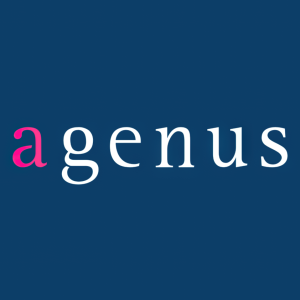Agenus Presents New Botensilimab/Balstilimab Data in Gastric Cancer at AACR IO Annual Meeting
Combination of Botensilimab/Balstilimab with MiNK Therapeutics’ AgenT-797 Shows Strong Immune Activation and Potential to Enhance Outcomes in Refractory Gastric Cancer
“These latest data demonstrate the remarkable potential of combining BOT/BAL with a novel iNKT cell therapy to broaden and intensify immune responses against resistant gastric tumors,” said Dr. Dhan Chand, Vice President of Research at Agenus. “By driving strong IFNγ production, deep T-cell infiltration, and memory T-cell activation—even in PD-1–refractory patients—the addition of agenT-797 to BOT/BAL could redefine what’s possible in late-line gastric cancer. We’re particularly encouraged by how these therapies work in concert with standard-of-care chemotherapy to transform immunologically 'cold' tumors into 'hot' immune inflamed tumors, potentially offering a new therapeutic paradigm for patients facing this challenging disease.”
Highlights
- Broad Immune Activation: The addition of MiNK’s allogeneic iNKT therapy, agenT-797, to BOT/BAL drove robust immune activation, including elevated interferon-gamma (IFNγ) levels, indicating potent systemic engagement and overcoming immunosuppressive pathways in PD-1–refractory gastric tumors.
- Enhanced T cell Infiltration and Memory T-Cell Expansion: A marked increase in tumor-infiltrating lymphocytes (TILs), together with heightened peripheral memory T-cell activation, underscores the potential for long-lasting anti-tumor immunity when combining BOT/BAL with agenT-797 (allo-iNKTs).
- Optimized Sequencing with Chemotherapy: Early administration of agenT-797 alongside BOT/BAL, before standard chemotherapy significantly amplifies immune responses, potentially reducing tumor recurrence through optimal T-cell priming, activation and mobilization.
Presentation Details:
Abstract Title: Biomarker analysis from Phase 2 study of AgenT-797 (invariant natural killer T-cells), botensilimab (a Fc-enhanced CTLA-4 Inhibitor) with balstilimab (anti-PD-1) in PD-1 refractory gastroesophageal cancer (GEC)
Presenting Author: Dr. Samuel Cytryn, Memorial Sloan Kettering Cancer Center,
Oral Session: Proffered Papers, Session 2; 1:39-1:45 p.m. PST
Poster Session: Poster Session, A; 1:45-4:45 p.m. PST
Date: Monday, February 24th
The presentation will be available on the publications page of the Agenus website at https://agenusbio.com/publications/ following the start of the conference session.
About Agenus
Agenus is a leading immuno-oncology company targeting cancer with a comprehensive pipeline of immunological agents. The company was founded in 1994 with a mission to expand patient populations benefiting from cancer immunotherapy through combination approaches, using a broad repertoire of antibody therapeutics, adoptive cell therapies (through MiNK Therapeutics) and adjuvants (through SaponiQx). Agenus has robust end-to-end development capabilities, across commercial and clinical cGMP manufacturing facilities, research and discovery, and a global clinical operations footprint. Agenus is headquartered in
About Botensilimab (BOT)
Botensilimab (BOT) is a human Fc enhanced CTLA-4 blocking antibody designed to boost both innate and adaptive anti-tumor immune responses. Its novel design leverages mechanisms of action to extend immunotherapy benefits to “cold” tumors which generally respond poorly to standard of care or are refractory to conventional PD-1/CTLA-4 therapies and investigational therapies.
Approximately 1,100 patients have been treated with botensilimab and/or balstilimab in phase 1 and phase 2 clinical trials. Botensilimab alone, or in combination with Agenus’ investigational PD-1 antibody, balstilimab, has shown clinical responses across nine metastatic, late-line cancers. For more information about botensilimab trials, visit www.clinicaltrials.gov with the identifiers NCT03860272, NCT05608044, NCT05630183, and NCT05529316.
About Balstilimab (BAL)
Balstilimab is a novel, fully human monoclonal immunoglobulin G4 (IgG4) designed to block PD-1 (programmed cell death protein 1) from interacting with its ligands PD-L1 and PD-L2. Botensilimab augments immune responses across a wide range of tumor types by priming and activating T cells, downregulating intratumoral regulatory T cells, activating myeloid cells and inducing long-term memory responses.
About AgenT-797
AgenT-797 is an allogeneic invariant natural killer T (iNKT) cell therapy that harnesses the dual power of innate and adaptive immunity. iNKTs function as “master regulators,” combining the cytotoxic capabilities of NK cells with T-cell–like antigen recognition and memory. This unique biology enables a robust, pathogen-agnostic immune response that can be directed against hard-to-treat tumors.
Manufactured by MiNK Therapeutics in
Forward-Looking Statements
This press release contains forward-looking statements that are made pursuant to the safe harbor provisions of the federal securities laws, including statements regarding its botensilimab and balstilimab programs, expected regulatory timelines and filings, and any other statements containing the words "may," "believes," "expects," "anticipates," "hopes," "intends," "plans," "forecasts," "estimates," "will," “establish,” “potential,” “superiority,” “best in class,” and similar expressions are intended to identify forward-looking statements. These forward-looking statements are subject to risks and uncertainties that could cause actual results to differ materially. These risks and uncertainties include, among others, the factors described under the Risk Factors section of our most recent Annual Report on Form 10-K for 2023, and subsequent Quarterly Reports on Form 10-Q filed with the Securities and Exchange Commission. Agenus cautions investors not to place considerable reliance on the forward-looking statements contained in this release. These statements speak only as of the date of this press release, and Agenus undertakes no obligation to update or revise the statements, other than to the extent required by law. All forward-looking statements are expressly qualified in their entirety by this cautionary statement.
View source version on businesswire.com: https://www.businesswire.com/news/home/20250224368708/en/
Investors
917-362-1370
investor@agenusbio.com
Media
510-323-5188
communications@agenusbio.com
Source: Agenus Inc.







